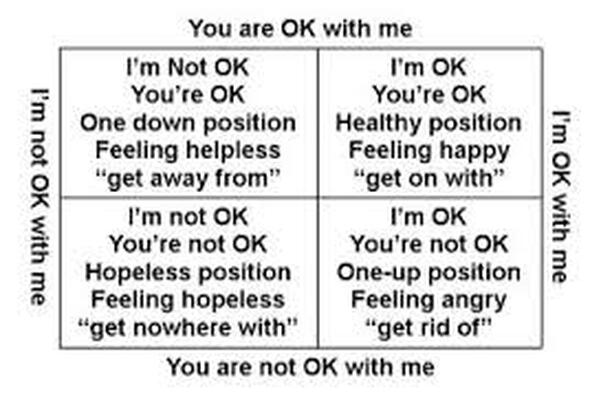|
We begin to form opinions and beliefs about ourselves, others and the world in early childhood. Throughout development, the child creates an image, map of the world, in TA called Frame of Reference, and what this image will look like is influenced by many factors. It begins with parents and other significant adults in childhood environment. The child imitates adult behavior, repeats beliefs, prohibitions, commandments, and other slogans he learns through socialization. Of course, the frame of reference is also influenced by the time we grow up in, political beliefs, the economic situation, safety, the system, attitudes towards health, freedom, equality, money, free time and other areas of life. In this time we also learn to have assumptions and prejudice that make us disable building qualitative and respectful relationships with other people. Dr. Eric Berne has developed a model of life positions where he defines an individual's attitude toward himself in relation to others in a given situation. Optimally would be to have an opinion about ourselves at all times and circumstances in awareness that we are OK and others are OK. "I am OK, you are OK" is position from which we can work constructively, solve problems and communicate with others in a way that we are heard, understood and at the same time it is respectful and understanding towards the others, no matter in what situation the other finds him self in. This mode of communication is assertive, the person is able to deal with the facts, the conversation is focused on problem solving. It is very important for leaders to be aware of the effectiveness of this position so that their employee can approach him with difficulties they encounter, to feel safe and respectful, to receive support in a constructive way, to be able rely and trust the superior. As the name implies, the position where the person is in the opinion "I am not OK, you are OK", is in a very passive state. The person feels frustrated, deals with the past, with work processes and is not focused on solutions and the future. The person in the position "I am OK, you are not OK" is aggressive, he feels resentful towards another person who did not fulfill his expectations, which is destructive in relationships of all kinds. A leader in this position execute pressure, force and control. When one person is in a position "I'm not OK, you're not OK", it is very difficult to work with. Subjects in this position retreats from contact, or keep defending their actions, do not face situations, are passive, and feel helpless. Is cynical or apathetic. A leader in this position has a difficult time surviving his or her duties. This position is damaging to anyone and person feeling this way should consult an expert, as it can be a sign of depression, contempt, self-contempt, or other conditions that call for change. We are not taking one life position in every situation, it's important to know that in different circumstances and with different people we might act from other positions. Although only "I am OK, you are OK" frame of reference can provide save and respectful attitude towards our self, others and the world around us. 
0 Comments
|
Author
I would like to introduce myself through posting about topics that occupy me and my working mind. This is the way you can get to know my professional frame of reference better. Archives
March 2020
Categories |

 RSS Feed
RSS Feed